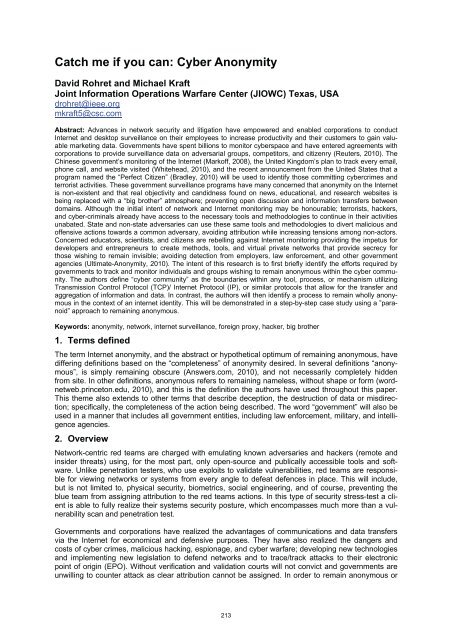6th European Conference - Academic Conferences
6th European Conference - Academic Conferences
6th European Conference - Academic Conferences
Create successful ePaper yourself
Turn your PDF publications into a flip-book with our unique Google optimized e-Paper software.
Catch me if you can: Cyber Anonymity<br />
David Rohret and Michael Kraft<br />
Joint Information Operations Warfare Center (JIOWC) Texas, USA<br />
drohret@ieee.org<br />
mkraft5@csc.com<br />
Abstract: Advances in network security and litigation have empowered and enabled corporations to conduct<br />
Internet and desktop surveillance on their employees to increase productivity and their customers to gain valuable<br />
marketing data. Governments have spent billions to monitor cyberspace and have entered agreements with<br />
corporations to provide surveillance data on adversarial groups, competitors, and citizenry (Reuters, 2010). The<br />
Chinese government’s monitoring of the Internet (Markoff, 2008), the United Kingdom’s plan to track every email,<br />
phone call, and website visited (Whitehead, 2010), and the recent announcement from the United States that a<br />
program named the “Perfect Citizen” (Bradley, 2010) will be used to identify those committing cybercrimes and<br />
terrorist activities. These government surveillance programs have many concerned that anonymity on the Internet<br />
is non-existent and that real objectivity and candidness found on news, educational, and research websites is<br />
being replaced with a “big brother” atmosphere; preventing open discussion and information transfers between<br />
domains. Although the initial intent of network and Internet monitoring may be honourable; terrorists, hackers,<br />
and cyber-criminals already have access to the necessary tools and methodologies to continue in their activities<br />
unabated. State and non-state adversaries can use these same tools and methodologies to divert malicious and<br />
offensive actions towards a common adversary, avoiding attribution while increasing tensions among non-actors.<br />
Concerned educators, scientists, and citizens are rebelling against Internet monitoring providing the impetus for<br />
developers and entrepreneurs to create methods, tools, and virtual private networks that provide secrecy for<br />
those wishing to remain invisible; avoiding detection from employers, law enforcement, and other government<br />
agencies (Ultimate-Anonymity, 2010). The intent of this research is to first briefly identify the efforts required by<br />
governments to track and monitor individuals and groups wishing to remain anonymous within the cyber community.<br />
The authors define “cyber community” as the boundaries within any tool, process, or mechanism utilizing<br />
Transmission Control Protocol (TCP)/ Internet Protocol (IP), or similar protocols that allow for the transfer and<br />
aggregation of information and data. In contrast, the authors will then identify a process to remain wholly anonymous<br />
in the context of an internet identity. This will be demonstrated in a step-by-step case study using a ”paranoid”<br />
approach to remaining anonymous.<br />
Keywords: anonymity, network, internet surveillance, foreign proxy, hacker, big brother<br />
1. Terms defined<br />
The term Internet anonymity, and the abstract or hypothetical optimum of remaining anonymous, have<br />
differing definitions based on the “completeness” of anonymity desired. In several definitions “anonymous”,<br />
is simply remaining obscure (Answers.com, 2010), and not necessarily completely hidden<br />
from site. In other definitions, anonymous refers to remaining nameless, without shape or form (wordnetweb.princeton.edu,<br />
2010), and this is the definition the authors have used throughout this paper.<br />
This theme also extends to other terms that describe deception, the destruction of data or misdirection;<br />
specifically, the completeness of the action being described. The word “government” will also be<br />
used in a manner that includes all government entities, including law enforcement, military, and intelligence<br />
agencies.<br />
2. Overview<br />
Network-centric red teams are charged with emulating known adversaries and hackers (remote and<br />
insider threats) using, for the most part, only open-source and publically accessible tools and software.<br />
Unlike penetration testers, who use exploits to validate vulnerabilities, red teams are responsible<br />
for viewing networks or systems from every angle to defeat defences in place. This will include,<br />
but is not limited to, physical security, biometrics, social engineering, and of course, preventing the<br />
blue team from assigning attribution to the red teams actions. In this type of security stress-test a client<br />
is able to fully realize their systems security posture, which encompasses much more than a vulnerability<br />
scan and penetration test.<br />
Governments and corporations have realized the advantages of communications and data transfers<br />
via the Internet for economical and defensive purposes. They have also realized the dangers and<br />
costs of cyber crimes, malicious hacking, espionage, and cyber warfare; developing new technologies<br />
and implementing new legislation to defend networks and to trace/track attacks to their electronic<br />
point of origin (EPO). Without verification and validation courts will not convict and governments are<br />
unwilling to counter attack as clear attribution cannot be assigned. In order to remain anonymous or<br />
213

















